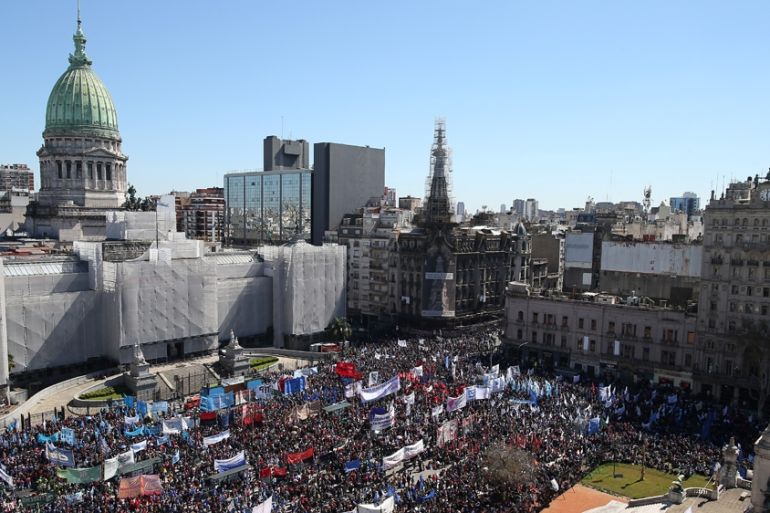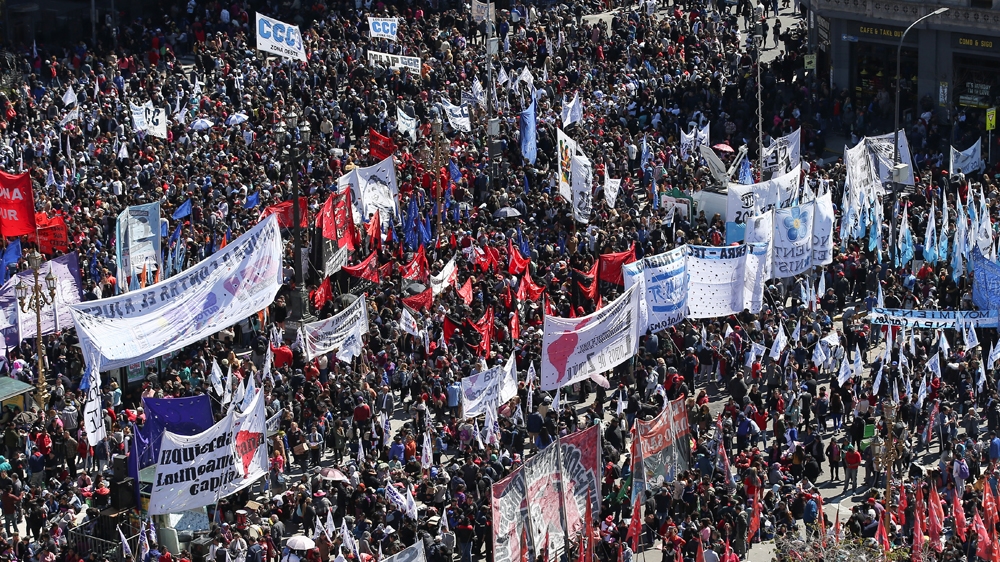‘The situation is dire’: Argentines protest over food crisis
Protesters gathered in Buenos Aires, demanding government take more actions to aid poor.

Thousands of Argentinian protesters have taken to the streets of the capital, Buenos Aires, demanding the government take action to address the deepening economic crisis.
Protesters gathered outside the National Congress in Buenos Aires on Thursday, for a second day, when the lower chamber met to pass a food emergency plan amid reports of rising hunger.
Keep reading
list of 4 itemsAir Vanuatu goes into liquidation, thousands of passengers stranded
‘We have no option’: An election protest brews in Indian coffee capital
As Singaporeans tire of rat race, incoming PM reimagines ‘Singapore Dream’
The bill was unanimously approved by legislators, but it is now awaiting approval by the Senate. If approved, the law would provide a 50 percent increase in food assistance programmes to the most needed ones.
The bill was first passed in 2002, when the economic collapse left one in five people unemployed, and now legislators are seeking to extend it once more.
“The situation is dire for all of us,” Ivan Martinez, a protester in Buenos Aires, told Al Jazeera.
“I’m a construction worker but there is no work. It’s difficult to feed my children. That’s why I come here because the president’s policies are slowly killing us.”
‘Manipulate the agenda’
However, some members of the government still remain sceptical and believe these demonstrations are organised by the opposition to manipulate the agenda ahead of the presidential elections slated to be held on October 27.
“We have lifted taxes from basic food items, increased a minimum wage, increased cash handouts and lots of other things to help those who need it,” Jorge Ricardo Enriquez, an Argentinian Congressman, told Al Jazeera.
“I don’t understand why people continue to protest because we are giving them what they need.”

Crisis amid electoral times
Argentina has been in a recession since last year, and has one of the highest inflation rates in the world, running at more than 54 percent. Unemployment has soared and the economy shrunk by 5.8 in the first quarter.
According to data from the UN’s Food and Agriculture Organization the country is also among the Latin American countries where hunger increased most during 2018.
Last year, the International Monetary Fund (IMF) also agreed to increase the size of its bailout to $57bn, while Argentina’s government agreed to cut pension benefits and public utility subsidies. The measures crippled the poorest sections of society.
President Mauricio Macri‘s popularity has fallen and in August his government suffered a crushing defeat in the presidential primaries.
Following that the peso lost 26 percent of its value against the dollar, the country’s risk index soared, and bond prices sank to record lows.
The government quickly imposed foreign-exchange controls and also requested a rescheduling of its debts.
“Now that you have capital controls there is some degree of tense calm to the markets,” Alan Cibils, an Argentinian economist, told Al Jazeera.
“Things will be stabilised. We will have to see at the end of the day how many reserves the central bank sold to maintain the exchange rate,” he added.
Amid economic uncertainty, Macri’s bid for reelection appears in serious jeopardy.